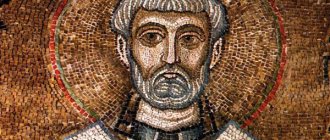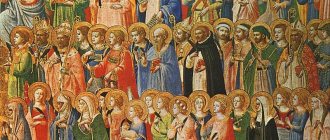Memorial Day: March 12(25)
Born around 540 into a noble and wealthy Roman family. Little is known about Gregory's activities before his accession to the papal throne. It is known that he was distinguished by great learning; for some time he was prefect of Rome, but in 574 he founded the monastery of St. Andrew in his possessions on the Caelian Hill in Rome and became a monk there.
In 579, the pope made him a deacon and sent him to Constantinople, where he asked to protect Rome from the Lombards, but Persian aggression prevented Byzantium from providing him military assistance.
In 585, Gregory returned to Rome, and in 590, after the death of Pelagius II during the plague, he became primate of the Church. It is believed that it was through his prayers that the epidemic stopped.
The name of Pope Gregory is associated with the rise of the Roman Church, which took over the reins of government from the secular administration, which was fading away under the blows of the barbarians. He personally led the defense of the city from the Lombards, and the leadership subordinate to Constantinople moved to Ravenna.
He tried to raise the authority of his department, which was pretty shaken at that time. The churches in the West clearly operated independently of Rome, especially in Carthage, Milan, and Aquileia. The relationship with the Patriarchate of Constantinople was also difficult. Of course, St. Gregory did not doubt the spiritual primacy of the Roman Church, but, nevertheless, not such a rigid church hierarchy headed by the Roman bishop as it later became. In contrast to the title “Ecumenical”, which began to be called the Patriarch of Constantinople, he called himself “a servant of the servants of God.” At the same time, Gregory considered it the duty of the Church to be a measure of piety and to criticize the actions of secular authorities when they do not act properly.
Constant state concerns interspersed with his labors to strengthen the declining Roman culture. His interpretations of the Holy Scriptures, numerous sermons and pastoral letters formed the backbone of the new Western theology, which would begin to develop later. He received the nickname “Dvoeslov” for one of his works “Dialogues”, dedicated to the lives of the saints of Italy.
St. Gregory composed in Latin the rite of the Liturgy of the Presanctified Gifts, which before him was known only in oral tradition. This order was approved at the VI Ecumenical Council in 680 and accepted by the entire Christian Church.
Constant wars, crop failures, and epidemics devastated the north of Italy; Gregory, exhausted by illness, dies in 604. His relics rest in the Cathedral of St. Apostle Peter in the Vatican. His veneration began quite early, and in the West the name “Great” stuck.
***
“Interlocutor” or “Double-talk”? Composition by St. Gregory the Great’s “Dialogues...” (translated as “Conversations...”, or “Interviews...”) – earned him the honorary title “Interlocutor.” The nickname “Dvoeslov”, which was assigned to it in the Slavic liturgical tradition, is associated with an erroneous translation of the Greek name of the ancient literary genre, which was included in Latin and other languages - διάλογος, dialogus, dialogue - “conversation”, conversation” (not necessarily two!), “exchange words." The Slavic translator, who was clearly dealing with the Greek text, confused the prefix διά-, dia- (in the meaning of through movement, reciprocity, that is, exchange of opinions) with the cardinal numeral δύο, duo- (lat. duo) - “two”, especially , that in late Greek the letter υ (“upsilon”) conveyed the sound “and”. It is significant that the compiler of the Slavic Menaion, who was more knowledgeable in Greek, translated correctly: “Interlocutor”!
Yuri Ruban, Ph.D. ist. Sciences, Ph.D. theology
Life of a Saint
His birth occurred in 540 in Rome. The family was quite famous, as several popes came from it. Great hopes were placed on the boy. He was given the best education, and upon completion of his studies a brilliant career as a statesman awaited him. But he felt a slightly different mission within himself. The attraction to serving the Lord became more and more evident. After the death of his father, he distributed all his property, mainly for the construction of monasteries. He himself took monastic vows and became a simple monk.
He spent most of his time not only in prayer, but also in writing down important things for posterity. A large number of works by Grigory Dvoeslov have reached our time and have not lost their relevance. He lived freely and thoroughly enjoyed this state of affairs. The only thing he had was a silver bowl, which he gave to a merchant who had been injured in a shipwreck. It was from that time that he felt true independence from worldly things.
He had to spend some time in Rome to show everyone the virtue and simplicity of life. Then, having captured the sacred relics, he arrived at his native monastery. He was elected rector there. He was able to combine such qualities as rigor, care and love for his flock. After the death of Pope Pelagius II, he was chosen as his successor.
The best article for you, go to: The Icon of the Mother of God Gerontissa, what it helps with, what they pray for
Many miracles happened during the period of the plague. He took the icon of the Mother of God and walked with it through the streets. The disease receded and people believed in the Lord. As soon as everything calmed down, the saint left his rank and decided to retire, but a sign from above betrayed him and he was forced to return again. After that, he was engaged not only in the development of the papal palace and the entire church, but also continued to write. The works of Gregory Dvoeslov in prison had instructions and morals.
For some time the primate suffered from illnesses, but they brought him more torment:
- barbarian raids;
- disorder inside the church;
- moral decline;
- destructive policy.
All this led to his death in 604. Memorial Day is considered to be March 25th.
Pope
After the death of Pelagius, Gregory became his successor, and five years later he was consecrated bishop, and then the people elected him as the new Pope. At that time, Italy was experiencing a crisis related to military and political actions. Moreover, only the Church was the structure that took care of the well-being of the country. Also, Holy Father Gregory, whose biography is briefly described in this article, made peace between the warring parties. As a representative of the church authorities, he led a modest life, was engaged in charity and missionary work. He also carried out church reform, he converted non-believers to Christianity.
Finally...
Pope Gregory remains strict, honest and logical in the memory of many people. He always did good deeds, gave alms, took care of the suffering and unfortunate. He received beggars in his house, and also ordered that the income from church properties be used for their maintenance. There is evidence that when Gregory had nothing to donate, he gave a silver dish on which vegetables were served to a beggar. Currently, the name of Father Gregory is combined with the word “Great”; he is revered at all times.
How does prayer to an icon of a saint help?
For his selflessness and love for the Lord, he was gifted with the gift of performing miracles. They could be different. The only thing that mattered was faith in the Lord. It is not surprising that after a long period of time people still try to beg for his mercy and help. Most often they ask him:
- strengthening faith;
- correctness in decision making;
- giving a miracle;
- healing from illnesses and other things.
The best article for you, go to: Pryazhevskaya Icon of the Mother of God, what they pray for, how it helps
It is important to know that everything can come true only if you ask from a pure heart and believe in the Lord’s help.
The prayer before the icon of Gregory the Dialogue of the Pope reads as follows:
«The lieutenant seemed to be the shepherd of Christ, / the monks of the succession, Father Gregory, / instructing the heavenly fence, / and from there you taught the flock of Christ with His commandment, / now you rejoice with them and rejoice in the heavenly roofs.”
Sometimes it is also used for prayer petition and the troparion to Gregory Dvoeslov:
“Who from God above have we received divine grace,/ glorious Gregory,/ and whom we strengthen with strength,/ you have deigned to march in the gospel./ From Christ you received the reward of your labors , O all-blessed one, / Pray to Him, / / May He save our souls.”
"Dialogues" by Gregory
The popular book "Dialogues" is a collection of stories about Italian saints that Gregory loved to tell his spiritual son. At the same time, descriptions of mystical events that are often found in work aroused great interest. Here you can find the exorcism of demons, descriptions of the afterlife, punishment of sinners, etc. Gregory the Great created the concept of purgatory, which is a place where the souls of dead people go to be cleansed of their sins through suffering. They established which sin corresponds to a particular period of stay in purgatory. This concept invented by him suggests that Father Gregory was a true Christian believer. In the same work, Gregory focused on the importance of prayers, humility and work.









